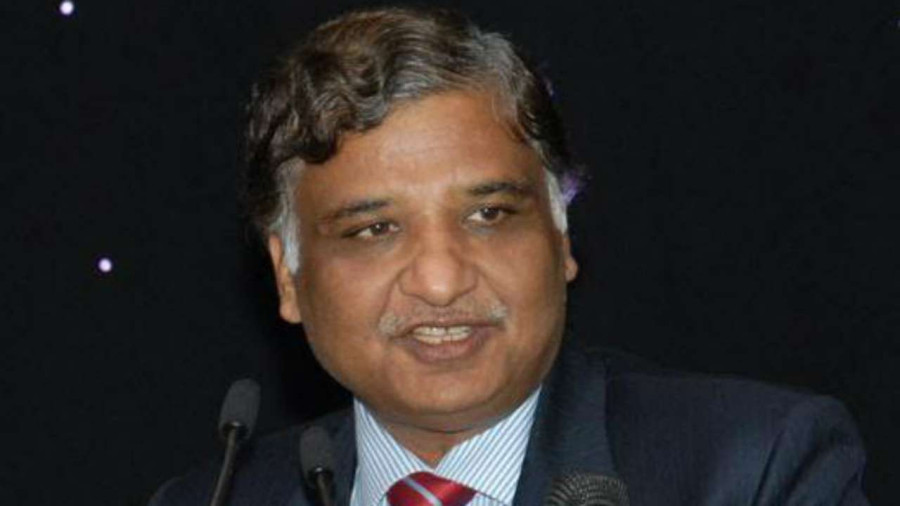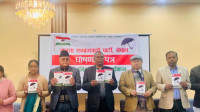National
India intelligence chief’s sudden dash for Kathmandu raises many an eyebrow
Oli’s meeting with Samant Goel could be aimed at mending the strained ties between Nepal and India, say observers, while party leaders disapprove of it saying it goes against diplomatic norms.
Anil Giri
Last week, when Prime Minister KP Sharma Oli effected a minor Cabinet rejig, one event that starkly stood out was his decision to remove Ishwar Pokhrel as the defence minister.
Oli took the defence portfolio with himself, leaving Pokhrel as deputy prime minister to “take care of” the Prime Minister’s Office.
Conjectures were that the Nepal Army chief was not happy with Pokhrel for some of his statements regarding the national defence force. Pokhrel was vocally critical of the Indian Army chief over the latter’s one statement in which he had said Nepal was taking umbrage at India at the behest of China.
Oli’s move of appointing some ministers had also sowed the seeds of discord in the ruling Nepal Communist Party (NCP), with Pushpa Kamal Dahal, the other chair, expressing dissatisfaction at the prime minister’s “unilateral move”.
The conflict in the ruling party further deepened after about a dozen and a half members of the provincial assembly in Karnali filed a no-confidence motion against Chief Minister Mahendra Bahadur Shahi. Of those who tried to remove Shahi, 15 are from the former CPN-UML, and of them at least eight represent the Oli faction.
Amid all these goings-on, India’s intelligence chief made a dash for Kathmandu, creating ripples among Nepali analysts, academia and intelligentsia.
Samant Kumar Goel, chief of India’s Research and Analysis Wing (R&AW), during his less than 24-hour stay in Kathmandu, met with Prime Minister KP Sharma Oli.
Confirming the meeting, Surya Thapa, Oli’s press adviser, said that Goel “paid a courtesy call on the prime minister on Wednesday evening”.
Thapa refused to provide the details. But there was no official representation from the Ministry of Foreign Affairs during the meeting between Oli and Goel, said a Foreign Ministry official.
A senior security official said Oli was alone while two officials accompanied Goel.
According to sources, the Oli-Goel meeting took place right after a meeting of the National Security Council, which ended at around 9:30pm.
Former prime ministers Dahal and Madhav Kumar Nepal on Thursday morning refuted reports suggesting their meetings with Goel.
Since there has been no official word–neither from New Delhi nor from Kathmandu, the motive behind the sudden visit of the chief of Indian intelligence agency remains a mystery.
Analysts and some ruling party leaders, however, say Goel’s brief visit to Kathmandu was part of a move choreographed by both the countries.
“As we know there are some misunderstandings between Nepal and India, Goel’s visit may be aimed at breaking the stalemate and bringing the bilateral ties back on track,” Bijaya Kant Lal Karna, a former ambassador, told the Post. “I think both sides want to engage at the top level and Goel’s visit could be the starting point.”
This, however, is not the first visit by Goel to Kathmandu during Oli’s tenure as the prime minister. Goel had landed in Kathmandu last year in July as well, at the invitation of the chief of the National Intelligence Department, the R&AW’s counterpart in Nepal.
Goel had met with Oli then too.
But many wonder why New Delhi would send an intelligence chief to Kathmandu to resume bilateral dialogue.
Former deputy prime minister and minister for defense and home Bhim Rawal questioned the timing of the visit and the way Goel met with the prime minister.
Nepal’s Foreign Ministry expressed its ignorance about Goel’s visit to Kathmandu, even though a request to allow the Indian Air Force plane, on which the Indian official arrived in Kathmandu, was made through the ministry. Flights between Nepal and India currently remain suspended due to the pandemic. The Oli administration is yet to respond to India’s request to resume flights.
During a meeting between Tourism Minister Yogesh Bhattarai and Indian Ambassador Vinay Mohan Kwatra a few weeks ago, they had also discussed, among other things, resumption of flights.
Analysts say apart from closely observing the ruling party’s internal issues, Delhi has been keeping a close eye on Beijing's growing influence in Nepal.
Of late, Beijing's moves in Kathmandu, without making any attempt to keep them clandestine, have become a cause for concern for Delhi. Chinese Ambassador Hou Yanqi earlier this year conducted a whirlwind of meetings with various leaders of the ruling party including Oli on two different occasions. The ruling party was facing a serious crisis at that time, with a factional feud threatening a split of the ruling party.
Besides discussing internal political situations of the ruling party, both Oli and Goel also discussed improving bilateral ties between Nepal and India, according to a top government official who spoke on condition of anonymity.
“The visit is aimed at improving bilateral relations,” said the official.
Another senior official familiar with the visit and discussions between Oli and Goel said that both sides are planning high-level exchanges immediately after Indian Army chief Manoj Mukund Narvane’s visit to Nepal.
Armies of Nepal and India share brotherly ties. During his visit to Kathmandu, Naravane will be conferred upon the honorary title of the chief of the Nepal Army as per a long-standing tradition between the two countries.
Officials said after Naravane’s visit to Kathmandu next month, both countries are planning a meeting at the foreign secretary level, largely focusing on issues related to the boundary.
Therefore, Goel’s visit is setting the tone for upcoming talks, according to the officials.
However, the Indian intelligence chief’s visit and his meetings in Kathmandu have not gone down well with some members of the ruling party itself.
Bishnu Rijal, deputy chief of the foreign affairs department of the ruling party, said politicians should not overstep in matters related to diplomacy.
“Diplomacy should be handled by diplomats—not politicians,” he said. “The present confusion over the visit of the R&AW chief is the result of the handling of diplomacy by politicians.”
Standing Committee member Bhim Rawal was more forthright in his views.
“The way the meeting of the chief of Indian intelligence R&AW with Nepal’s prime minister was conducted and the timing and manner of the visit, which is contrary to Nepal’s foreign policy, sovereignty and independence as guided by the constitution and the thought, policy and declaration of the NCP that is leading the government, is objectionable. It is against diplomatic norms.” Rawal wrote on Twitter.
Karna, the former ambassador, said Indian officials’ meetings with Nepali leaders, even top ones and the prime ministers, are not surprising, as such things have been practised long enough to become a tradition.
“One thing, however, has become apparent now—Oli’s nationalistic credentials are now under question,” Karna told the Post.




 17.12°C Kathmandu
17.12°C Kathmandu















